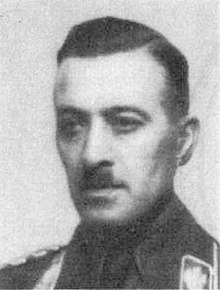Arthur Böckenhauer
Arthur Böckenhauer (born September 13, 1899 in Hamburg ; † April 18, 1953 , according to other information April 18, 1945 in Hamburg) was a member of the Reichstag of the NSDAP and held leading positions in the SA .
Life
Böckenhauer attended elementary and advanced training school in Hamburg. After completing a commercial apprenticeship, he worked as an employee in his apprenticeship and at the same time completed a pre-military training. During the First World War , he volunteered as a war volunteer in 1918, where he was deployed as a non-commissioned officer on the Western Front and wounded once. He was awarded the Iron Cross, 2nd class. After the end of the war he was accepted into the provisional Reichswehr and worked at the army technical school of the Reichsheeres.
Böckenhauer was a member of the Freikorps in 1919 and 1920 . Between 1920 and 1922 he belonged to various völkisch-nationalist organizations before he joined the NSDAP and the SA on October 1, 1922 . From January to November 1923 he was SA leader in Hamburg. After the NSDAP and SA were banned after the Hitler putsch in November 1923, Böckenhauer led a Hamburg front organization of the SA, which called itself the "Blücher von 1923 Gymnastics, Sports and Hiking Association". Worked as a bank clerk in 1923 and 1924, Böckenhauer became a police officer in the Hamburg regulatory police in 1925.
After the re-admission of the NSDAP, Böckenhauer rejoined the party on August 1, 1925 (membership no. 12.815). In the previous month he had taken over the management of the Hamburg SA again. Because of this political activity, he was dismissed from the police force without notice on November 2, 1926 and then worked in various professions until 1930. From August 21, 1927, he was SA-Gausturmführer "Nordmark" responsible for the districts of Schleswig-Holstein, Hamburg and Lüneburg-Stade. As an SS leader , he was also responsible for the same area . On May 8, 1928, he was expelled from the NSDAP and the SA (the reasons for the expulsion are not known, the expulsion is not mentioned in the official Reichstag handbooks from the time of National Socialism), but again in the NSDAP in 1930 and in the 1931 Sat recorded.
On the occasion of the Reichstag election of July 1932, Böckenhauer was elected as a candidate of the NSDAP in the Reichstag, to which he - after confirming his mandate in the elections of November 1932 and March 1933 - initially belonged for three (each greatly shortened) electoral periods until November 1933. After he was not a member of the politically insignificant parliament from November 1933 to May 1936, he was able to return to the Reichstag on the occasion of the May 1936 election - to which, of course, only candidates on the NSDAP's unified list were admitted - to which he now remains until the end belonged to the Nazi dictatorship in spring 1945.
Böckenhauer held various management positions in the Hamburg SA until March 1, 1934, most recently he was special commissioner of the SA leadership there. During this time he was promoted to SA group leader on March 1, 1933. From March 1, 1934 to May 31, 1935 he worked as a department chief in the staff of the Supreme SA Leadership (OSAF), where he was involved in the processing of the affairs of the SA Feldjägerkorps. From May 1, 1935 to October 31, 1937, Böckenhauer finally served, also on the OSAF staff, as head of the judicial and legal department of the Supreme SA leadership. In the period from May 1 to November 30, 1936, he was also responsible for the executive management of the OSAF Personnel Office. While he was a member of the OSAF, he was promoted to SA-Obergruppenführer on November 9, 1936.
From autumn 1937 to early summer 1938 Böckenhauer left OSAF temporarily in order to head the SA Group Lower Saxony from November 1, 1937 to May 31, 1938, based in Hanover . On June 1, 1938, he returned to OSAF, where he held the position of full-time chief under the chiefs of staff Viktor Lutze and Wilhelm Schepmann until the end of the Second World War . During the Second World War he took part in the western campaign in 1940 as a reserve captain . He was awarded the Iron Cross 1st Class and the Iron Cross 2nd Class clasp. From November 7, 1941, Böckenhauer was involved in judgments of the People's Court as an honorary member .
There are contradicting information on the date of Böckenhauer's death.
literature
- Hansjoachim W. Koch: People's Court. Political Justice in the Third Reich. Munich, 1988.
- Joachim Lilla , Martin Döring, Andreas Schulz: extras in uniform. The members of the Reichstag 1933–1945. A biographical manual. Including the ethnic and National Socialist members of the Reichstag from May 1924. Droste, Düsseldorf 2004, ISBN 3-7700-5254-4 .
- Martin Schumacher: Md R. The Reichstag members of the Weimar Republic in the time of National Socialism. Political persecution, emigration and expatriation 1933-1945. A biographical documentation. 3rd extended edition, Droste, Düsseldorf, 1994. ISBN 3-7700-5183-1 .
- Max Schwarz : MdR. Biographical handbook of the German Reichstag. Hanover, 1965.
- Erich Stockhorst: 5000 heads: who was what in the 3rd Reich. 2nd edition, Arndt-Verlag, Kiel, 1985. ISBN 3-88741-117-X .
Individual evidence
- ↑ Joachim Lilla, pages 26 and 47
Web links
- Arthur Böckenhauer in the database of members of the Reichstag
| personal data | |
|---|---|
| SURNAME | Böckenhauer, Arthur |
| BRIEF DESCRIPTION | German politician (NSDAP), MdR and SA leader |
| DATE OF BIRTH | September 13, 1899 |
| PLACE OF BIRTH | Hamburg |
| DATE OF DEATH | April 18, 1953 |
| Place of death | Hamburg |
